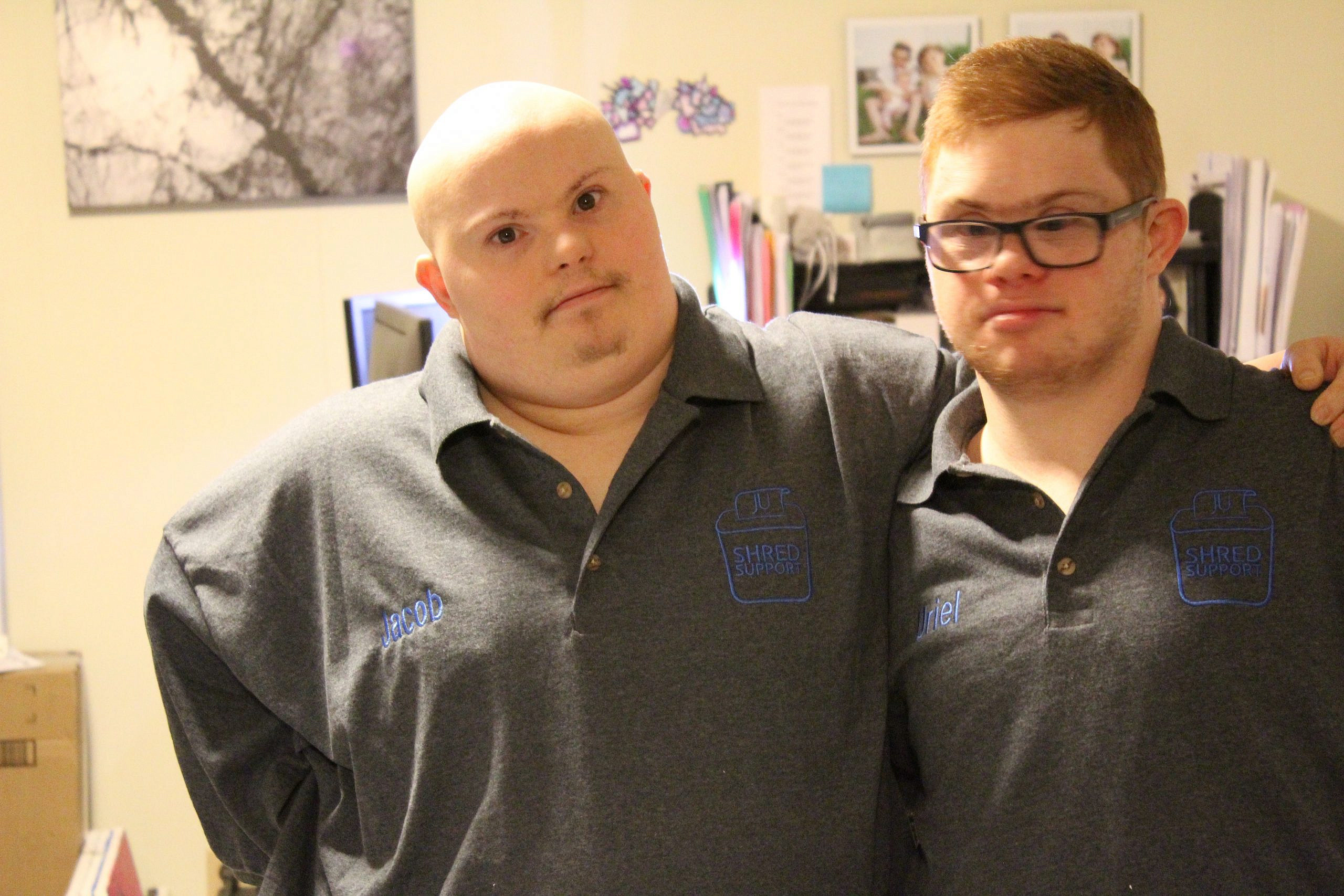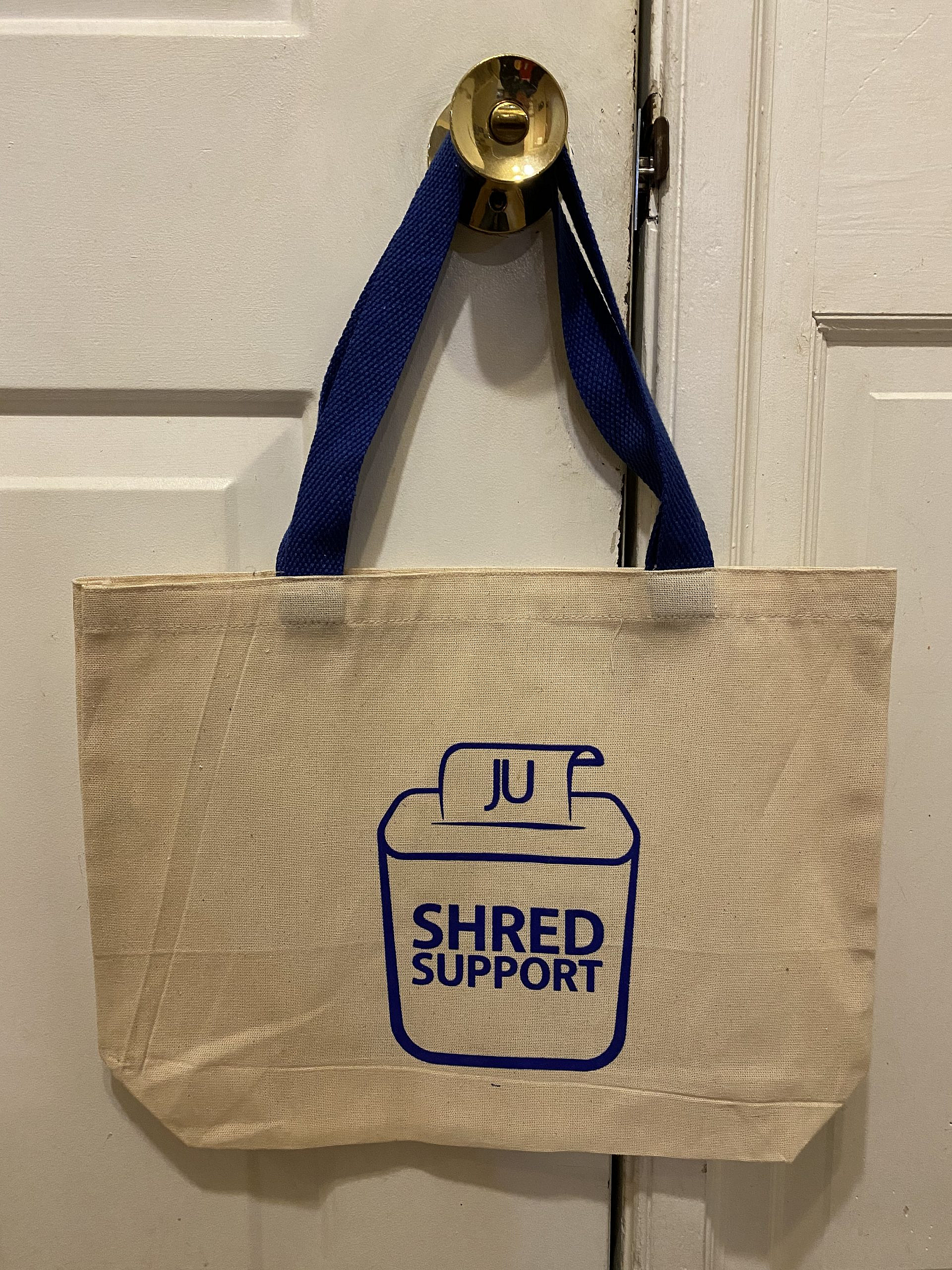
Best friends Uriel Levitt and Jacob Werbin, both with disabilities, found themselves out of work. Unable to go to camp last summer, they founded a company with the help of their mothers and the support of their community.
People with disabilities have been particularly hard-hit by the coronavirus pandemic: the shift to online learning has been challenging, in-person socialization opportunities have been curtailed or canceled, and most live internships and employment came to an abrupt halt. Two Washington, D.C.-area moms experienced this situation with their children and wound up taking matters into their own hands.
They brainstormed with their 25-year-old sons—both of whom have Down syndrome—considered their interests and strengths, and came up with a plan: creating Shred Support, a home-based paper-shredding business.
Uriel Levitt and Jacob Werbin, the company’s co-founders, are best friends. They live in Washington and enjoy their summers together in the Tikvah Program at Camp Ramah in New England. Both are participants in the vocational education program, where they spend their summers immersed in camp life and working in the mercaz (the camp mailroom) sorting letters, packages and faxes.
Each took the job skills that they acquired at camp and found volunteer jobs in their home communities. Jacob worked at a local UPS store and Uriel at the University of Maryland Hillel cafeteria until COVID restrictions forced them home.
When the pandemic hit, they were laid off and had to deal with the disappointment of their beloved summer camp being closed for the summer as well.
“Uriel was not happy,” said his mother, Dina Levitt. “We didn’t want him to just sit around.” Levitt and Jacob’s mother, Amy Blum, knew how much their sons liked to work. They also knew the staggering statistics around the employment of people with disabilities.
And, acknowledged Uriel, “we like to earn money.”

Dina added that “we wanted them to have something to do other than sitting in front of a screen all day, and they like to help people.”
Next came a brainstorming session where the four considered skills, interests, experience and a setting that would be safe and not out exposed to the community. They decided to start what the moms call a “values-based business” that would employ adults with disabilities “who are ready to get to work and be productive members of the community.”
The business would also be connected to the local community by giving tzedakah (10 percent of profits) and offering volunteer opportunities for high school students.
So far, Shred Support has made donations to Camp Ramah New England; Kemp Mill Synagogue in Maryland; Young Israel Shomrei Emunah of Greater Washington; and
Chabad of Silver Spring, Md. They have also pledged to give to the Silver Spring Christian Reformed Church food pantry in Maryland; and Yad Yehuda in Silver Spring, Md.
“Creating a shredding business was a natural; it was purposeful and meaningful,” said Blum. It is also a way to provide training in the hard and soft skills of a job, including operating a shredder, sorting, keeping the workspace clean, as well as time management, organization and problem solving, she added.
Uriel and Jacob each operate a heavy-duty shredder that accommodates more than 100 documents at a time. Customers fill out an online order form, and moms Dina and Amy, who serve as office support, email customers and coordinate drop-off times. They are also in charge of sending invoices and collecting payments. Jacob and Uriel maintain the shredders and place shredded paper in large recycle bags that get picked up weekly.
In addition to the experience the business offers their sons, Dina sees a tremendous benefit to the community. “This is an incredible opportunity for people in the community to see what these amazing men can do.”
‘This has been the silver lining’
Yvonne White, a community member who also has the pleasure of working with Jacob and Uriel at Camp Ramah, said “it is exciting to see Jacob and Uriel open their own business, a risk most people shy away from even in the best of circumstances. I know Jacob and Uriel to be motivated and hardworking individuals, and this is a fantastic way to harness their skills while providing a service to the community.”
She added that “the success of Shred Support is a positive example of why we should have more jobs readily available for people with disabilities in the workforce. Everyone has skills and deserves the opportunity to contribute meaningfully to our society.”

Jacob and Uriel juggle the demands of work with extracurriculars such as art classes, Spirit Club exercise sessions and time with family. Some days are busier than others. “We have a lot of papers. We got 12 boxes to shred today,” offered Uriel.
Dina Levitt noted that they recently received about 300 pounds of material at once, saying “they won’t be able to do all that in a day.” Her son, agreeing “that’s not happening,” added that in addition to the service itself, the work is “kind of fun.”
Blum is enthusiastic about the role the business plays for their sons and for the community.
“This has been the silver lining,” she said. “It has provided opportunities for the guys to do something meaningful. It provides satisfaction and helps them see how valued they are in the community.”
Levitt was also quick to clarify: “It’s not just a COVID Band-Aid.”
In fact, the young men have already been featured on a local NBC Channel 4 news segment in January and are hard at work considering their next steps, which include feasibility studies, a five-year business plan, formalizing the business structure and searching for investors.
(JNS).